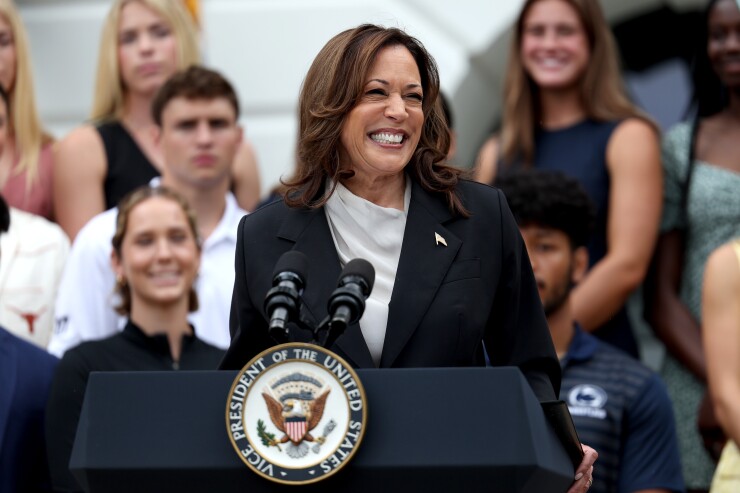
It's likely that very few people have heard of the U.S. Digital Service. But Kamala Harris' push to expand the agency suggests that a potential Harris presidency could lay the groundwork for a central bank digital currency.
In 2020, then-Senator Harris proposed an unsuccessful
"One of the issues that is up for discussion with digital money is: It could give the Federal Reserve more power," said David Bieri, an associate professor of urban affairs at Virginia Tech University. "The link that Harris may make is to emphasize the inclusion concept. If the Fed were to have a digital dollar it could benefit marginalized segments."
While the Obama Administration created the USDS to improve the technology that underpinned the Affordable Care Act, the USDS' work provided early technology that can power a digital dollar, which remains in limbo in the U.S. as CBDC projects advance in dozens of other countries.
CBDCs are designed to streamline payments that involve a central bank, with the goal of expanding access to financial services or speeding payment processing. CBDCs can also serve as an alternative to private digital assets, such as stablecoins or other forms of cryptocurrency. In the U.S., CBDCs have faced
"The argument from the conservative point of view is that digital currencies could disintermediate the banking industry," Bieri said. "It would give the Federal Reserve more control."
The battle over a CBDC in the U.S. will play out against the backdrop of the 2024 election, which will include
Harris could use the power of the presidency to advocate publicly for a CBDC and lobby members of Congress and regulators for approval. Pushing for a digital dollar could also be a way for Harris to forge a
If Harris becomes president in January, there are reasons to think the U.S. will issue a CBDC soon, according to Robert Hockett, a law professor at Cornell University. Harris' push to increase the funding of the USDS puts her on record as supporting an initiative that could lead to a digital dollar. Hockett, who worked on a
"Such a system could serve as a public option for digital banking and payments for all Americans, eliminating the problems of inefficient clearing and the plight of the unbanked in a single stroke," Hockett said. "Since the Treasury would have to coordinate any such system with Fed monetary operations, a digital Treasury dollar would amount to a CBDC."
Harris is from the San Francisco Bay Area and has long been a proponent of technological innovation, according to Susan Lindeque, CEO of Avestix, a financial services firm specializing in technology-focused investment products. As vice president, it appears Harris tempered that support because Biden took a more cautious approach to digital assets, Lindeque said.
"However, should Harris's bid for the White House pick up speed, it's easy to imagine her coming out more aggressively in favor of innovations such as a digital dollar, which could help counter [GOP Vice Presidential candidate] J.D. Vance's [ties to Silicon Valley]," Lindeque said.
As vice president, Harris in 2023 led the Women in the Sustainable Economy (
Another participant, Mastercard, has invested $9 million in Pakistan, Peru and Vietnam through WISE and the Strive Women Initiative. Mastercard's project reached 6 million entrepreneurs, mostly women, who accessed financial and payment technology through the program. And Visa has invested $52 million through WISE over the past three years to finance about 1.4 million small businesses globally. Visa network also made a $3 million grant to the Climate Gender Equity Fund via its WISE participation.
"So it's also safe to assume Harris could also encourage more women entrepreneurs in tech," Lindeque said.






